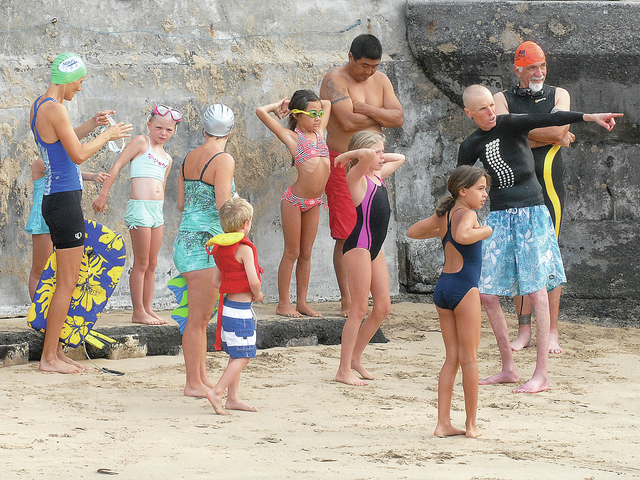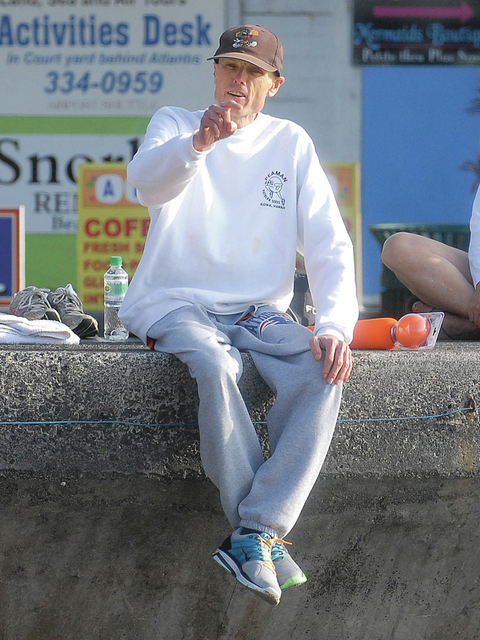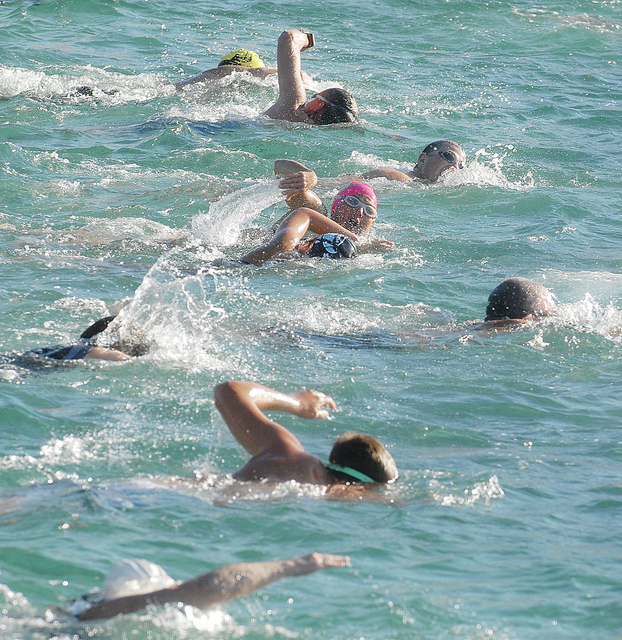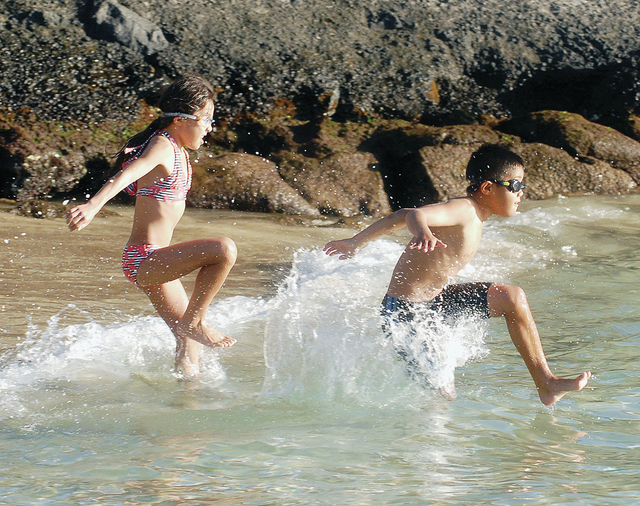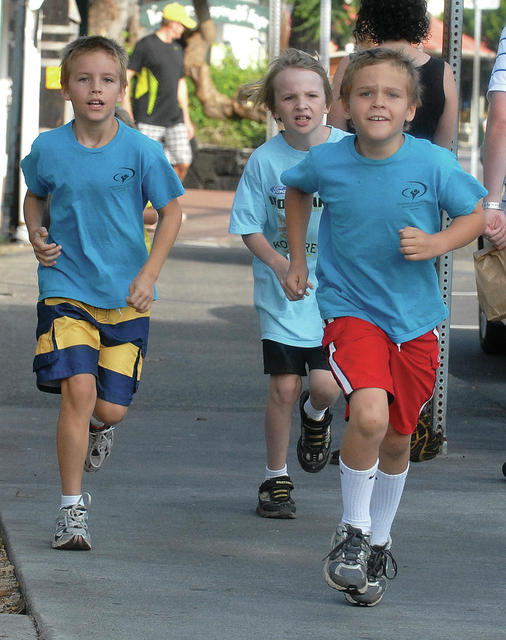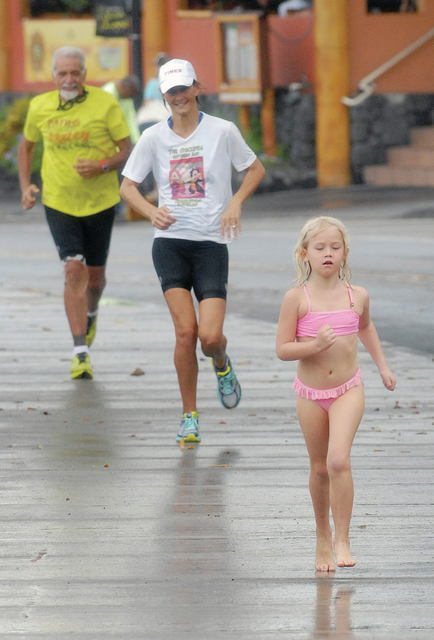KAILUA-KONA — The Peaman event series has become an informal institution in Kona — a part of the fabric of the community.
But a recent confrontation between Sean “Peaman” Pagett — the organizer of the Frozen Pea Productions events — and an unnamed employee of the Hawaii Department of Land and Natural Resources regarding a permitting issue threatened the future of the monthly races, which have been a staple of the area over the past 30 years.
The Post Pigout Peamania, a swim/run race set every year for the Sunday after Thanksgiving, was held Nov. 27 at Kailua Pier and marked the 29th anniversary of Peaman races on Hawaii Island.
But as the event was kicking off, Peaman was approached by a man from the DLNR’s Division of Boating and Ocean Recreation. The employee told Peaman he was shutting down the event because its participants weren’t permitted to use the ocean for the swimming portion of the race.
“They decided to flex their muscle on Sunday and tell me we needed a permit. I disagreed,” Peaman said. “Who owns the ocean? My stance is I don’t feel we should need a permit to use the ocean.”
The altercation between Peaman and the DOBOR employee grew heated, and the employee — whose name DOBOR declined to provide — called for backup.
“The fellow I was chatting with said, and this is a direct quote, ‘I need armed backup,’” Peaman said.
Three DLNR officers soon arrived, and after a long discussion, the event was allowed to continue. They told Peaman, however, that if he didn’t procure the proper permit prior to his next race — Peaman’s Birthday Bonanza, which falls this year on Christmas Day — DOBOR would shut it down.
The permit process for events like Peaman’s has two layers. One permit is required for use of the pier, the other permit is for use of the ocean in the context of a staged event.
Bill Taylor, DOBOR Hawaii District manager, said the permit process itself is free, although there is a rental fee for use of the pier, which runs at 25 cents per square foot used, as that space is then not available for use by the public.
Using the ocean is free, but obtaining the permit to do so for an event requires liability insurance to cover any harm that may come to participants during the course of the race.
That insurance costs money Peaman said he doesn’t have, as he already operates what he calls a “negative-profit company,” meaning the monthly races are paid for out of his own pocket to the tune of around $700 per event.
The events are free-of-charge to participants and are operated by a team of unpaid volunteers.
Taylor acknowledged the confrontation between one of his employees and Peaman on Sunday got a little out of control, adding that the situation could have been avoided and also misrepresented the role DOBOR plays in requiring permits for ocean use.
“You’re supposed to provide some type of insurance to relieve any liability from your event on the state and also on you, the organizer. That’s the purpose of insurance,” Taylor explained. “The purpose of the permit is to basically make, for lack of better words, the ocean-using public aware there’s an event going on to reduce conflicts and ensure everyone’s safety.”
Peaman said he was taken aback somewhat by the timing of the DOBOR employee’s attempt to shut down the race, an attempt he called premeditated, as the events have been taking place for nearly three decades.
Peaman said he had permits up until about 15 years ago. When requirements for permits changed and began necessitating insurance coverage, he stopped applying.
Since that time, Peaman has had conversations on a few occasions with representatives of the DLNR in which the need for permits was discussed, but Sunday was the first time anyone had ever tried to shut him down.
Taylor, who has managed the district for DOBOR for only the last five months, said he couldn’t speak to why the department hadn’t more aggressively pursued permitting requirements for Peaman events in the past.
Taylor further explained that the DLNR could retroactively levy fines against Peaman for events that were held without a permit, but that he has no desire or intention to do so.
“We’ve been doing it forever, and it’s never been a problem. It’s well received by the community,” Peaman said. “The intent of the events was to create something that was free and family-oriented, where people could come down and afford to bring the kids. Inclusion is an important factor for us. One of our mottos is that if we don’t have a division for you, we’ll create one.”
Christine DeCarli, 40, moved to Kona 15 years ago and began competing in Peaman events in 2010. Since then, she has become a volunteer, helping stage the monthly races because she believes they’re that important to locals.
“I think they’re amazing for our community. They’re a way for families and friends to get together doing something healthy, doing something fun,” she said. “And aside from all he does for the community, as a friend, I really think putting on these events has been a light in Peaman’s life. It’s given him a lot of joy to be with people, to feel like he’s helping people, and he loves to have fun. And that’s what these events are — pure, clean fun.”
Taylor agreed with DeCarli’s assessment, adding that the last thing he wants to see is the end of Peaman events in Kona.
“I think the events are valuable,” Taylor said. “I have friends who participate in them. They’re good for the community. I want to keep them running. I don’t want them to be shut down.”
To that end, Taylor and Peaman connected by phone Thursday afternoon to discuss the issues and set up a meeting.
Both men said the conversation was cordial and productive, and both are confident that meeting somewhere in the middle, where state regulations are observed and the Peaman events are allowed to continue without onerous costs or logistical hassles, is a readily achievable goal.
“Bill Taylor was positive, and he said we both have the same goal — to keep (the races) going,” Peaman said. “We’ll have to negotiate a little bit on how to do a few of the different things. We may have to go to waivers, have people sign waivers, which we’ve never done. But the main thing is whatever we have to do to keep the (events) going is what we’re going to do.”
Taylor echoed Peaman’s comments.
“The plans are to get everyone into compliance with the marine permitting requirements, and I think we can come to a reasonable agreement. I don’t want to be adversarial,” said Taylor, adding the only cost issue that can’t be avoided is the rental use of the peer, although Peaman said his events can continue without that use. “We want to make sure everyone is protected. I am confident we are going to get there.”







